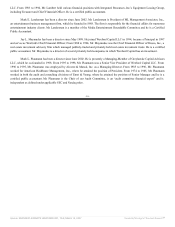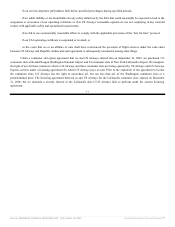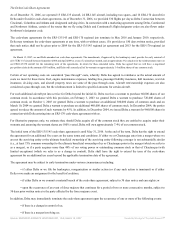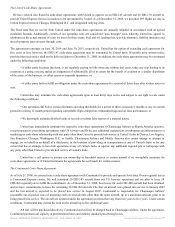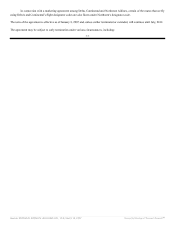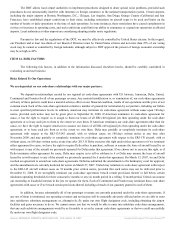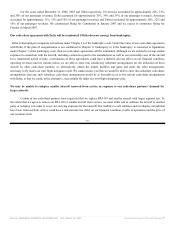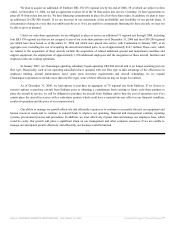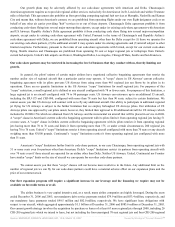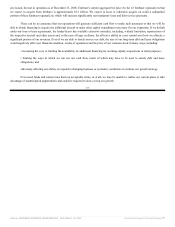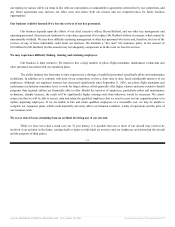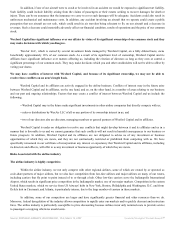Frontier Airlines 2006 Annual Report Download - page 27
Download and view the complete annual report
Please find page 27 of the 2006 Frontier Airlines annual report below. You can navigate through the pages in the report by either clicking on the pages listed below, or by using the keyword search tool below to find specific information within the annual report.
• immediately, by Continental, upon the occurrence of an event that constitutes cause, subject to prior written notice to us; or
• if either Continental or we commit a material breach of the code-share agreement, subject to two business days notice if we
breach the agreement and five business days notice if Continental breaches the agreement; or
• if there is a change in control of us or Continental.
The Frontier Code-Share Agreement
On January 11, 2007, we entered into a code-share agreement with Frontier. Under the agreement, we will provide and operate
seventeen 76-seat Embraer 170 regional jets for Frontier and expect to begin service in March 2007.
Frontier will purchase all capacity at predetermined rates and will directly pay or reimburse Republic Airline for industry
standard pass-through costs. The first aircraft is expected to be placed into service in March 2007 and the last aircraft in December
2008. The agreement has a term of eleven years from the date of the last aircraft delivery. Frontier has the option to extend the
agreement for up to six additional years. All fuel will be purchased directly by Frontier and will not be charged back to Republic.
Republic Airline is responsible for all costs and expenses of preparing each covered aircraft prior to its being placed into service.
The term of the agreement is effective as of March, 2007, and, unless earlier terminated or extended, will continue until December
2019.
The agreement may be subject to early termination under various circumstances including:
• immediately, by Frontier, upon the occurrence of an event that constitutes cause, subject to prior written notice to us; or
• if either Frontier or we commit a material breach of the code-share agreement, subject to two business days notice if we
breach the agreement and five business days notice if Frontier breaches the agreement; or
• if there is a change in control of us or Frontier.
Competition and Economic Conditions
The airline industry is highly competitive. We not only compete with other regional airlines, some of which are owned by or
are operated as code-share partners of major airlines, but also face competition from low-fare airlines and major airlines on some of
our routes.
The principal competitive factors in the regional airline industry are location, fare pricing, frequent flyer loyalty programs,
customer service, routes served, flight schedules, aircraft types and code-share relationships. Certain of our competitors are larger and
have significantly greater financial and other resources than we do. Moreover, federal deregulation of the industry allows competitors
to rapidly enter our markets and to quickly discount and restructure fares. The airline industry is particularly susceptible to price
discounting because airlines incur only nominal costs to provide service to passengers occupying otherwise unsold seats.
Generally, the airline industry is highly sensitive to general economic conditions, in large part due to the discretionary nature
of a substantial percentage of both business and pleasure travel. In the past, many airlines have reported decreased earnings or
substantial losses resulting from periods of economic recession, heavy fare discounting, high fuel prices and other factors. Economic
downturns combined with competitive pressures have contributed to a number of bankruptcies and liquidations among major and
regional carriers. The effect of economic downturns is somewhat mitigated by our fixed-fee arrangements with respect to our flights.
In addition, if our major airline code-share partners remain financially strained by low ticket prices or high fuel prices, they will likely
seek to reduce our fixed-fees or reduce the number of flights we operate in order to reduce their costs.
Government Regulation
All interstate air carriers are subject to regulation by the Department of Transportation, referred to as the DOT, the Federal
Aviation Administration, or FAA, the TSA, or Transportation Security Administration and certain other governmental agencies.
Regulations promulgated by the DOT primarily relate to economic aspects of air service, those of the TSA to security and those of the
FAA to safety. The FAA requires operating, air worthiness and other certificates; approval of personnel who may engage in flight
Source: REPUBLIC AIRWAYS HOLDINGS INC, 10-K, March 15, 2007 Powered by Morningstar® Document Research℠



